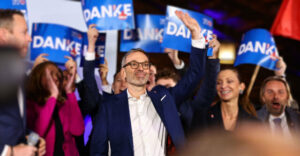Herbert Kickl, leader of Austria’s far-right Freedom Party (FPÖ), described the historic victory in Sunday’s elections as the beginning of a new era.
Kickl’s party secured 29.2% of the vote and 58 seats in parliament, although this does not grant them a majority (Austria’s parliament has 183 seats).
In second place was the conservative People’s Party (ÖVP) with 26.5% and 52 seats, while the Socialist Party (SPO) came third with 21% and 41 seats.

Kickl’s Core Pledge: “Fortress Austria”
Kickl’s main campaign promise was to turn Austria into a “fortress,” aiming to restore security and peace, aligning himself politically with Hungary’s Viktor Orbán. Kickl also expressed a desire to become a “Volkskanzler” (people’s chancellor), a term that evokes for many Austrians associations with Adolf Hitler’s rhetoric in Nazi Germany.
Challenges in Forming a Government
Voter turnout was 74.9%, with key election issues including immigration, asylum, economic decline, and the war in Ukraine. Analyses suggest that the FPÖ’s main supporters were voters aged 35-59 and women. While the FPÖ has been part of coalition governments before, the second-placed ÖVP has ruled out joining a government led by Kickl. Outgoing Chancellor Karl Nehammer stated it is “impossible to form a government with someone who worships conspiracy theories.” Likewise, the Socialists, Greens, and Neos have rejected cooperation with the far right.
Alarm Raised by the Auschwitz Committee
The International Auschwitz Committee described this first post-WWII election win for a far-right party in Austria as a “warning” for Europe. Christoph Heubner, the executive vice-president of the committee, emphasized that the election result adds a new and alarming chapter to the existing fears and concerns of Holocaust survivors. He urged pro-democracy forces across Europe to unite against the ideology of old and new far-right extremists.
European Concerns About the FPÖ’s Victory
The FPÖ, originally founded by former Nazis, campaigned with anti-immigration rhetoric and the slogan “Fortress Austria – Fortress Europe,” echoing the rise of far-right movements in the Netherlands, Italy, France, and Germany.
How the Press Views the Result
Austrian and German media outlets reacted strongly to the election results. Kurier described it as a “historic victory” for Kickl, while Der Standard called it a “political earthquake.” Die Presse described it as a “triumph for Kickl,” and the Kronen Zeitung referred to it as an “epochal change” for the Austrian parliament.
German newspapers also focused on the broader implications. The Süddeutsche Zeitung suggested that if the ÖVP wants to remain in power, it will need to find coalition partners outside of the FPÖ, while Frankfurter Allgemeine Zeitung noted that under Kickl, the FPÖ has become increasingly radicalized, with xenophobic rhetoric and open alignment with far-right extremists.
Ask me anything
Explore related questions





